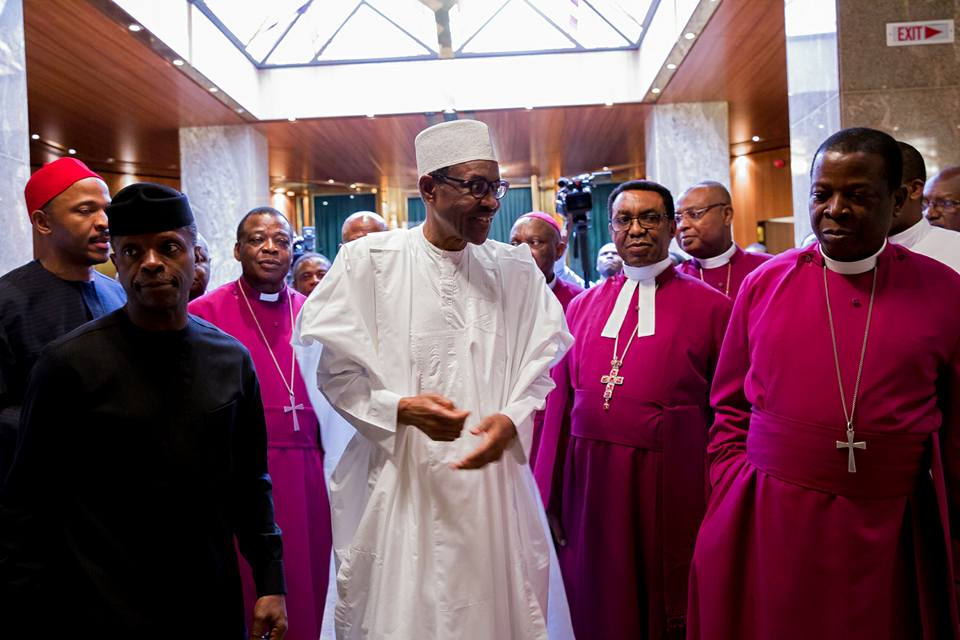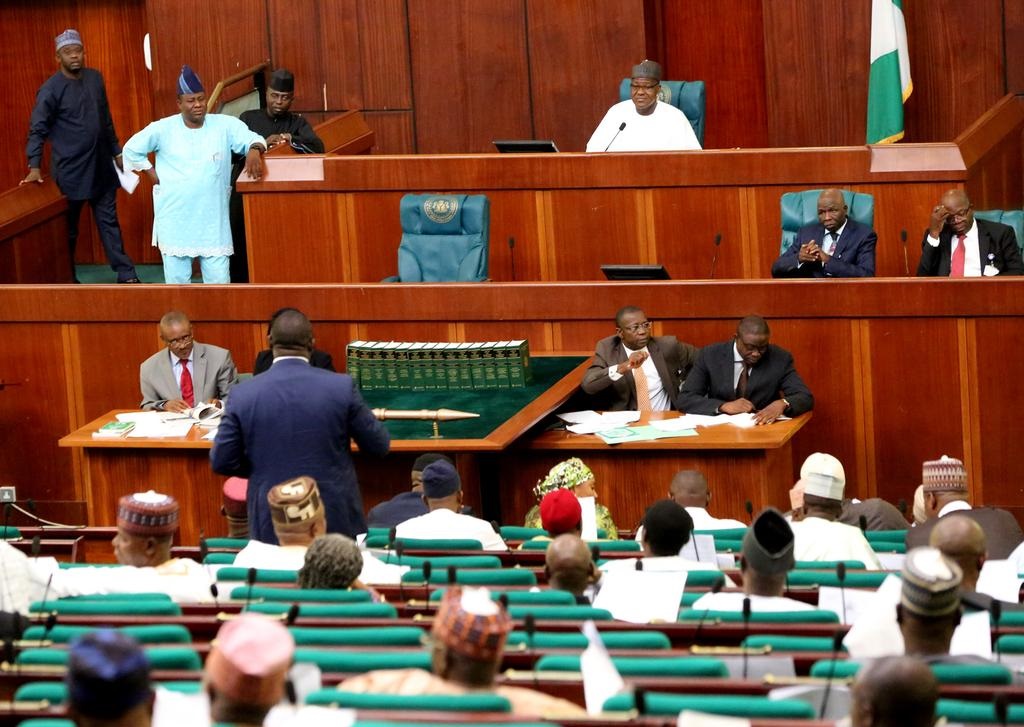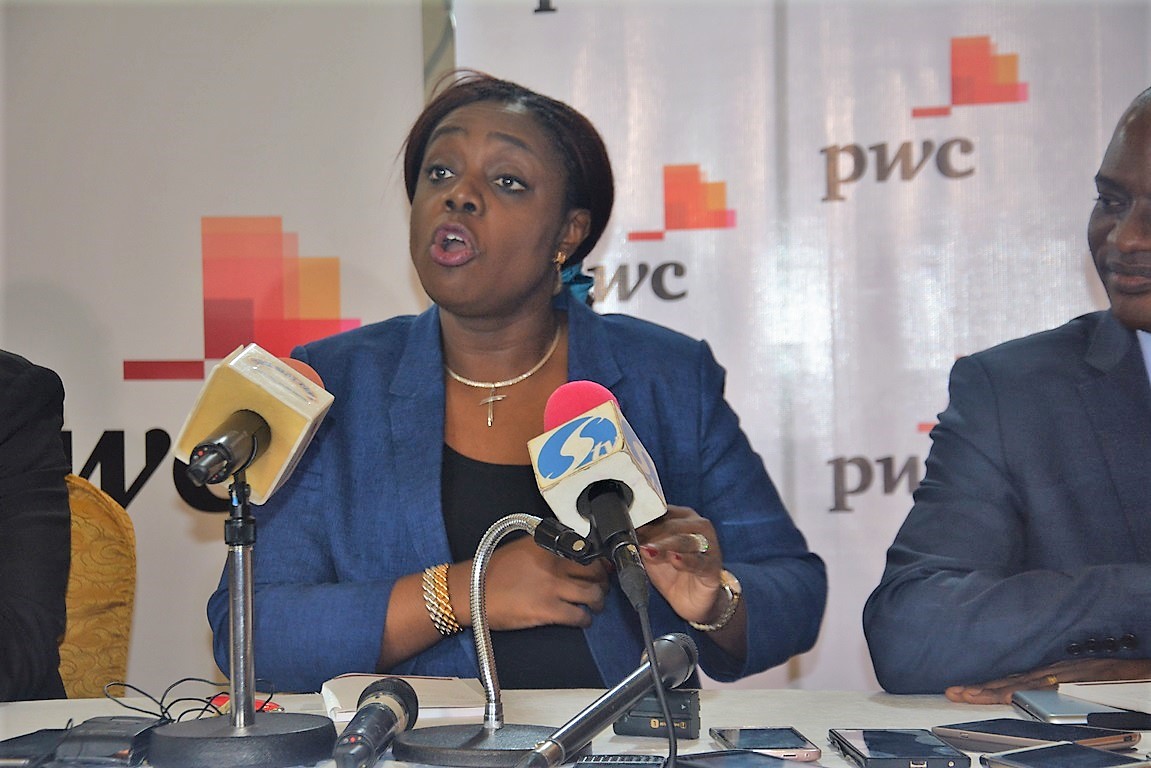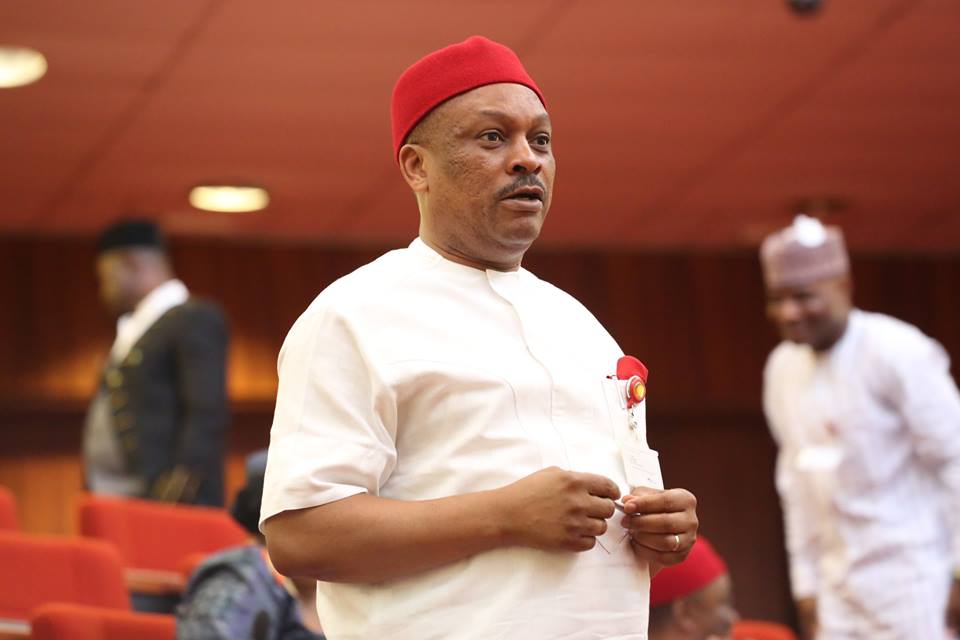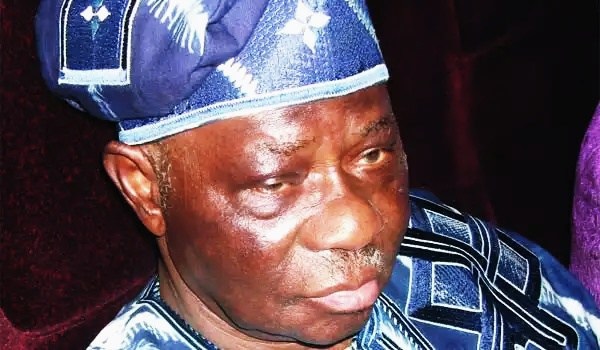President Buhari receives the Primate and Archbishops of the Church of Nigeria (Anglican Communion) in Statehouse on 3rd June 2016.
The Church, right from the medieval times, performed the role of the main stabilizing force in Western Europe. Not only did it provide religious leadership, it also offered the world secular leadership as well. Through the Roman Catholic Church, the Church satisfied the spiritual needs of the medieval society. The Pope, who headed the Roman Catholic Church, offered ordinary folks of the time earthly and spiritual comforts in troubled times. Since it was the largest landholder in Europe at this period, the Church also possessed wide-ranging and significant economic powers. It played a very dominant role in reviving, as well as preserving, ancient Greek and Roman texts.
In Africa, the church was no less dominant in the lives of the people. It played a formidable role in speeding up the end of colonialism and was responsible for the stoppage of slavery and apartheid in Africa, especially, its role in pushing up the internal contradictions of colonialism which led to the nationalist struggle for independence. The modern church has even played a greater role, especially in the mounting secular challenges of the 21st-century, most significantly, the increasing attempt by science and technology to swap the place of faith and the role of God in the lives of the human being.
Yes, science and technology have eliminated the spatial gaps in communication. Technology, for instance, has found easier ways of either curing or reducing the pains hitherto suffered in terminal ailments. In spite of the above, however, technology has proven critically unable to fill the void in the life of the human being. As predicted in II Timothy 3:1 which says, “but know this, that in the last days, perilous times will come,” the perilous times are actually here and science and technology are profoundly incapable of providing solutions to the existential pains suffered by humanity. The perilous times are the existential void, agony and crises that man undergoes today. The pains man underwent decades ago are little compared to his challenges today. The Church is still where people frequent for solutions to these existential crises and where they get “spiritual fixes” whenever they get to inexplicable crossroads of their lives.
Overtime, governments were the pinnacle of hope of redemption for man and society. Today, however, governments, all over the world, are literally throwing their hands up in surrender. The perils and pains of society are proving intractable for secular powers-that-be, where man laid his hope. Unemployment has reached a crescendo that is unprecedented in the world; economic, health and social crises have proven really indomitable, in spite of coordinated attempts to tackle them. Hopelessness is becoming infectious like a pestilence and the world, which had made governments and technology its hope, especially since the renaissance period, is returning to the Church for the way out of its existential dilemma.
Advertisement
The above are also very true of the Nigerian situation. The situation is perhaps even worse. Economic and social problems in Nigeria are on the upswing, indeed in an unprecedentedly scary manner since the amalgamation of the country. Our children come out of schools every year to join an army of unemployed persons. In the bid to wriggle out of this societal hopelessness, our children take to drugs at frightening dimensions, making the rate of youth who take drugs today to climb to a pandemic level. Statistics of spousal abuses are becoming scary as pent-up angers and frustration about life are tearing husbands and wives asunder in homes. Never has the church faced this level of massive hopelessness and disenchantment of its flocks. Having encountered failure in looking up to government for remedy, the Church is the only hope of the people today.
Statistical data show that church members are more beggarly than they have ever been; in spite of the wealth of the Nigerian nation. Also, despite the unprecedented technological advancements made in the area of health, the number of church members who die of ordinary sicknesses and diseases and sundry other challenges are on the increase. The church is indeed the hope of the common man for remedy.
The political society has dealt very unkindly with the church. Every time election is nigh, politicians who pretend that they are examples of that meek and temperate servant in the bible, come to the church to seek its partnership in securing power. Once they assume power, however, not only do they fail to advance the cause of the people who constitute the catchment area of the church, they put greater burden on the church.
Advertisement
Thus, the church cannot but be interested in good governance and a better society. To seek a better society, the church must fortify its understanding of what the power equation in society is, what the challenges are and why it has become such a rocket science for politicians to give the people good life. I guess this lecture is one of the church’s attempts at understanding what the challenges of good governance are and the way forward for Nigeria.
Challenges of 2019 elections
In the build-ups to the Nigerian federal elections which will hold in 2019, there have been several fascinating and interesting scenarios which cannot but interest any student of history. Already, the Independent National Electoral Commission (INEC) has cried out that the growing number of political parties would certainly pose challenges to the commission in the 2019 general elections. According to the Chief Technical Adviser to the INEC Chairman, Prof. Bolade Eyinla recently, the 68 registered parties at present, which would translate into 68 party agents in each polling unit and 68 party names on INEC ballot papers, could pose a massive challenge of management to the electoral umpire. If this is added to the other challenge of INEC having to monitor the congresses, conventions and primaries of the 68 parties who are contesting for, conservatively, 1000 elective positions, the challenge could be imagined.
As we speak, President Muhammadu Buhari has on his table the Revised 2019 Electoral Bill. He is likely to decline assent to the bill, in which case, the National Assembly, by a two-third of the two houses, can override it. In the bill, the National Assembly reordered the course of the proposed elections as earlier scheduled by INEC. INEC had proposed to have the presidential and National Assembly elections first on the same day and the governorship and State Houses of Assembly last. However, the National Assembly changed this order to its own election coming first, governorship and Houses of Assembly election next and the presidential election to be held last. Many people have reasoned that the federal parliament was merely being smart as configuring its elections to hold same day with the presidential election could tie its fate with that of the president’s. Which the National Assembly does not want. Even though this was for selfish purpose, God is perhaps using the parliament’s foolish self-centeredness to establish the people’s electoral freedom from the hands of elections that do not represent the wishes of the people.
Advertisement
You will recall that this scenario of having the presidential election on the same day with that of the federal legislators paid off for the legislators in the 2015 elections because, many of them, relatively unknown by the electorate, got voted into office on the hitherto goodwill and name of General Buhari. However, today, same is not the story as the parliamentarians ostensibly felt that the president’s goodwill had plummeted greatly, a baggage he could carry into the elections.
The challenge of the practice of party politics in Nigeria today is also a major challenge to the 2019 elections. As I wrote in my column in the Sunday Tribune of March 4, 2018, I said that, comparatively, especially with the First and Second Republics, party politics, like everything bright and beautiful in Nigeria, has become withered flowers. Today, party politics has taken a turn for the worse. Not only has it lost its reverence, parties have no ideological base any longer. Moneybags superintend over the fates of political parties and this is simply because ordinary party men do not own the political parties. The only way to own the parties is to return to what obtained in the First and Second Republics where party men contributed weekly or monthly dues and had the power to ask how they were being administered or how their monies were being spent.
Political parties today have become mere organs of winning elections. Political party system, we must note, is central to the survival of any democracy. It is indeed the platform for recruitment of leadership. In Nigeria’s weak political architecture and absence of democratic political culture can be found the nil or weak democratic institutions of the Nigerian state. Some people have argued that the weak party politics Nigeria runs is a product of military authoritarianism and authoritarian legacy we inherited.
The result of the weak party structure that we have today in Nigeria is that, once the political party is not able to guarantee equitable choice, it destroys the foundation upon which representative government stands, limits and pollutes the choice of the people and ultimately provides a wonky and tainted foundation for the electoral process. And the holy writ asks that once the foundation is destroyed, what can the righteous do?
Advertisement
Once we do not get party politics right, we can as well forget about democracy. Party nomination or party primaries is the most integral element of democracy. These have been so corrupted in Nigerian party system, so much that there can be no logical mode of producing God-fearing representatives of the people with the current political party status quo. There is thus no wonder that Nigeria hasn’t been able to get democracy right since.
For the church and many Nigerians, the challenge goes beyond the above. In my estimation, the greatest challenge for the church is the quality and inner constitution of elected representatives who would carry the baton of power from 2019 and beyond. For, if Nigeria is not successful in electing God-fearing men and women into positions of power in 2019, who will in turn ameliorate the social burdens that have consequentially become the heavy load which the church carries today, the pressure on the church would multiply, probably leading to a revolt of immense proportion.
Advertisement
The first challenge which the church has to confront is the need for it to wake up from its apathy and lethargy of the past towards politics and the process of acquiring political power. You cannot blame the church wholesale for this. The church had been driven away from having anything to do with the process of seeking power. The backstabbing, murder, corruption, occultist search for power and sundry vices of politicking in Nigeria would make anyone who has integrity to protect to see politics and politicians as lepers. An average Nigerian politician will kill his father and rope his mother for the murder once it leads to political office. This has been on since the 1950s when indigenous party politics took over in the country. It has driven away many God-fearing people who had the heart of bringing meaningful changes into governance.
Over the years however, due to the abdication of space by the righteous for the unrighteous to reign, the worst of us have superintended over the best of us, while the collective keeps silent. Nigeria has been battling challenges of corruption, nepotism, selfish leadership, ethnic irredentism and cronyism, among sundry others. These challenges are brought about by the executive who execute haphazard and self-centered policies which have kept Nigeria down; as well as the legislators who legislate unrighteousness as the credo of Nigeria’s legal code. So, for how long will the righteous stay on the sideline and allow the heathens take up the space to foul up Nigeria? This perhaps is the greatest challenge which confronts the church as Nigeria marches to the 2019 elections.
Advertisement
The first way out is that the church must purge itself of its ancient allergy to politics. Not only must it come out of its hiding place, the church must take full and undisguised interest in who runs for offices, from the minutest to the biggest office in the land. Due to its closeness to the congregation, who make up the electorate and the people at the grassroots, the church has an understanding of who the nefarious people in communities and society as a whole are. It must move against the reprehensible set of people who contest elective offices and who have, over the years, drawn Nigeria backwards. The church must also wholeheartedly goad on and support the few good ones in society who demonstrate purity of mind and character.
Even though the time is very short, the time to begin this task is now. My personal take is that the church must however be religion-blind in this task. This is because there are several people out there of different and even nil faiths but whose purity of mind is not in doubt. The church must embark on a methodic process of identifying them and parceling them for the process of seeking political power. The same zeal with which the church evangelizes for lost souls must be deployed in searching for the thousands of pure souls who can be encouraged to change the already messed up status-quo. Even though there cannot be any logical expectation that the church would be hundred per cent successful in getting righteous men to be in power in 2019, whatever strides it makes could be the foundation for future attempts.
Advertisement
The church must also encourage the calls for a return to full-blown democracy in political parties. As it is now, the political parties are in the hands of a very few cabals who do not mean well for Nigeria but who crave a rehash of the same political party system with which they promote charlatans and never-do-wells to political relevance. This has resulted in the unmitigated disaster of governance in Nigeria. Governors, ministers and other political party barons have hijacked the parties, the only vehicle through which anyone who wants to contest political office can deploy. The result is that, if party politics is this uncharted and atrocious, it would be difficult to change the status quo from what it is to what the church and Nigerians in general want it to be, so as to better the lot of the common man on the streets.
Party members must collect their parties from moneybags who run them today and this can be done by fastidiously paying their tokens at party meetings. We must also ensure that only those who have verifiable means of livelihood are nominated for party offices. The mistake of electing those who do not have verifiable means of livelihood is that, they become easily purchasable and worsen the take for the Nigerian people.
Perhaps the most important challenge for the church is how to mobilize its members and communities within its jurisdiction to collect the Permanent Voter’s Card (PVC). This is an urgent imperative. Due to its age-long apathy towards the process of acquiring political power, the church has shown little interest in this core area of electioneering. For 2019, there must be an urgent reversal of this mindset. Since PVC ownership is a sine qua non for electing persons into office, other tasks earlier enunciated seem to be secondary when compared to the urgent need to collect the voter’s card. It would not be out of tune if the church dedicates some days to encouraging its members to collect the PVCs. It is when the church has ensured that members have sufficiently procured PVCs that it could go ahead with other strategic plans of securing the buying-in of its worthy sons and daughters into the task of vying for elections.
Of important interest to the church and the 2019 elections should be the current herdsmen’s crisis. It is apparent that President Buhari cannot be divorced from his paternalistic embrace of his kinsmen whenever they are at loggerheads with other Nigerians. He did that while Governor Lam Adesina was in office when he gathered his Fulani brothers and arrived Ibadan. He had asked the governor, why are your people killing my people? That was Buhari in his unpolluted essence. In today’s dailies, the president, toeing earlier comment of another Fulani, the Emir of Kano, Lamido Sanusi, had said that the number of people (apparently Fulani herdsmen) killed in Taraba was more than those killed in Benue, Zamfara. It is the first time in my life I would hear such an indecorous comment from the president of a nation justifying a killing over the other.
What that means, as I said recently, is that if President Buhari is re-elected in 2019, he will continue to side with his Fulani herdsmen kinsmen in clashes with the rest of Nigeria. The killings will get to a climax and Nigerians will be forced to revolt. The presidency and its security apparatus, controlled by the likes of the Minister of Defence, who is also a Fulani and many other Northerners, will send in troops to repel the attacks. May God help us not to return to Aburi, post-2019.
More fundamentally, the church must begin to speak up on the side of righteousness over policies at local, state and federal levels. You will recall that your fellow clergymen – Bishops of the Catholic Church, recently spoke truth to power in an unprecedented way. They had met President Buhari at the Aso Rock Villa and told him to his face that the ship of state was in the process of capsizing. They spoke against the bloodletting in the country which are said to be superintended over by Fulani herdsmen and how the President had literally kept silent. I have said it at another forum that the blood that has been shed in the last years of President Buhari’s government has rivaled that which was shed in the Nigerian civil war. A combination of all those speaking up to power has culminated in the President waking up only yesterday to embark on tours of Taraba, Benue and Nassarawa states where the herdsmen have killed hundreds of people.
Even though Christians and politics are uneasy partners, we must begin to befriend politics. Of a truth, philosophers like Nietzsche believe that this kind of alliance could lead to crisis, but the facts of our current helplessness as a people dictate that the church must take more than a passing interest in politics. Nietzsche had said that we must be careful, lest in fighting the dragon, we become the dragon but doesn’t the church possess the fire of the Holy Spirit any longer? Should the fire that the dragon spits frighten the church?
In conclusion, I must state that the task of befriending politics in the build-up to 2019 for the church, is very crucial. It is indeed in the interest of the church to so do. Otherwise, there may be a revolt among the congregation at their worsening plights. May God have mercy on us all.
Add a comment

